What will happen to the marine life in the Philippines if overfishing continues? The Philippines, with its rich marine biodiversity, is facing a big threat. Overfishing is a major challenge to the environment and marine life. The fisheries sector is vital to the country’s economy, providing jobs and income for many Filipinos.
The Philippines has a vast marine territory, with 7,641 islands and 2,200,000 km2 of total territorial water. The country’s fishing industry is in crisis due to overfishing. Fisheries production has dropped by more than 60% to 80% because of it.
This decline has led to extreme poverty in fishing communities. About 1.2 million jobs in fishing, tourism, and food sectors are at risk due to poor oceans management.
Key Takeaways
- Overfishing is a major challenge faced by Filipino fisherfolk in the West Philippine Sea.
- The Philippines has a significant marine territory, with 7,641 islands and 2,200,000 km2 of total territorial water.
- Fisheries production in the Philippines has declined by more than 60% to 80% due to overfishing.
- About 1.2 million jobs in the fishing, tourism, and food sectors would be directly affected by poor oceans management.
- Urgent action is needed to establish more marine reserves and reduce fishing capacity to sustainable levels.
- The Philippines is known for being one of the major fish producers globally, ranking 13th in 2020 and contributing nearly 1.76 million metric tons in terms of marine capture production.
Understanding Overfishing
Overfishing is a big problem for our oceans. It’s important to know why it happens and how it affects our seas. Fishing has helped people for centuries, but unsustainable fishing practices have harmed fish populations. This hurts the sustainability of our marine ecosystem.
Recent studies show that 82% of wild-caught fish come from healthy fisheries worldwide. But, 34% of marine fish stocks were overfished in 2017. The main reason is the growing demand for fish, leading to excessive fishing and illegal fishing vessels.
The effects of overfishing on our oceans are huge. We need to start using sustainable fishing methods to lessen these impacts. Some important facts about overfishing include:
- 69% of the world’s fisheries are sustainably managed.
- Fish can quickly recover because they have many offspring.
- Management efforts try to get fisheries close to the best sustainability levels.
To fight overfishing, we must have good management plans. This includes regulating fishing and protecting marine habitats. By choosing sustainable fishing, we can keep our oceans healthy. This ensures fish populations stay strong for the future.
| Year | Percentage of Overfished Stocks |
|---|---|
| 1974 | 10% |
| 2015 | 33.1% |
The State of Philippine Marine Ecosystems
The Philippines is known for its rich marine life, with many species found nowhere else. These marine ecosystems are vital for the country’s economy and food supply. Yet, only a third of the Philippines’ marine protected areas (MPAs) are well-managed. This means they protect about 1% of the country’s coral reefs.
Some key statistics about the Philippines’ marine ecosystems include:
- The Philippines reported protecting 9.7% of its seascapes under its MPA system in 2020.
- In the last decade, the Philippines lost one-third of its coral cover.
- Nearly 75% of the country’s fishing grounds are overfished.
The Visayas region of the Philippines has a third of the country’s MPAs. Seven MPAs cover 548,157 hectares. The Pilar Municipal Marine Park (PMMP) is a success story, with 11,308 residents managing it. Social preparations are key for a community-managed marine reserve, as local livelihoods are important for its success.
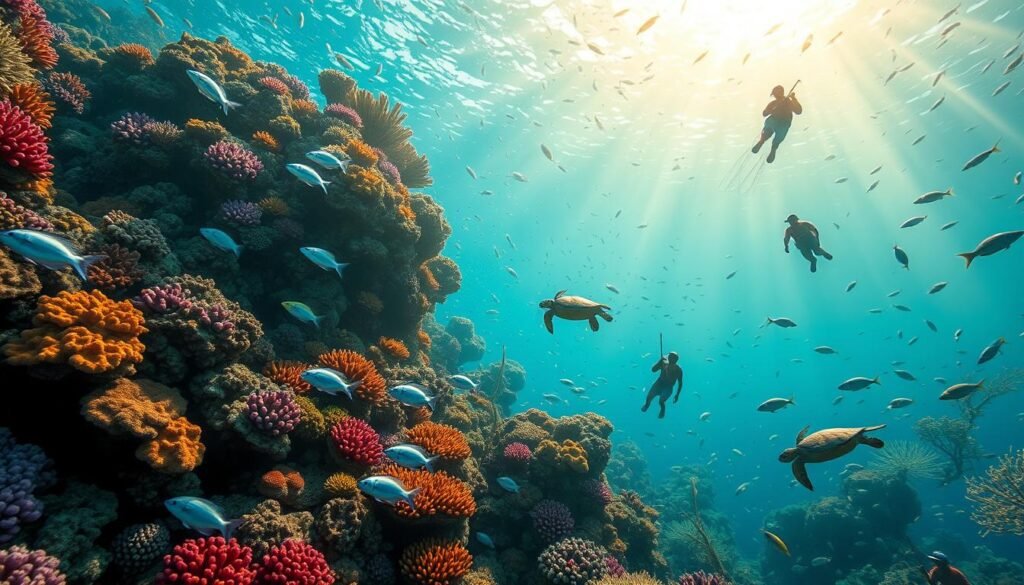
The Philippines boasts over 16,800 sq km of coral reef, making it a global hotspot for marine biodiversity. A study in the Philippine Journal of Science found that 90% of the country’s reefs are in poor or fair condition. The United Nations warns that without drastic cuts in carbon emissions, all 29 World Heritage coral reefs, including one in the Philippines, will disappear by 2100.
| Category | Description |
|---|---|
| Marine Protected Areas | Only a third of the Philippines’ marine protected areas are well-managed |
| Coral Reefs | The Philippines is home to over 16,800 sq km of coral reef |
| Fishing Grounds | Nearly 75% of the country’s fishing grounds are overfished |
Impact of Overfishing on Marine Species
Overfishing harms marine ecosystems a lot. It leads to fewer fish and less biodiversity. The fishing industry’s growth means more fishing. This depletes fish populations, affecting other marine species that eat fish.
Overfishing affects marine species in many ways. Sustainability is key to keeping fish populations healthy. Some effects include:
- Fish populations decline, making it hard for them to reproduce.
- Fish depletion disrupts the food chain, harming other marine species.
- Some fish species are at risk of extinction, threatening ecosystems and jobs.
It’s vital to have sustainable fishing practices. This helps fish populations recover and marine ecosystems stay healthy. We can do this by limiting catches, protecting habitats, and promoting sustainability in fishing.
Socioeconomic Implications of Overfishing
Overfishing hurts not just the environment but also people’s lives. The collapse of the Atlantic Canadian cod fishery in the 1990s is a prime example. It led to many fishers losing their jobs, forcing them to find new careers.
In places like Africa and South Asia, fish is a big part of people’s diets. It can make up to 50% of their protein. This shows how vital fish stocks are for these communities’ survival. The marine life in these areas is key to their well-being.
Some of the main effects of overfishing include:
- Loss of income and employment for fishers and related industries
- Decline in fish stocks, leading to reduced profitability in fishing
- Financial hardships and unemployment in fishing fleets
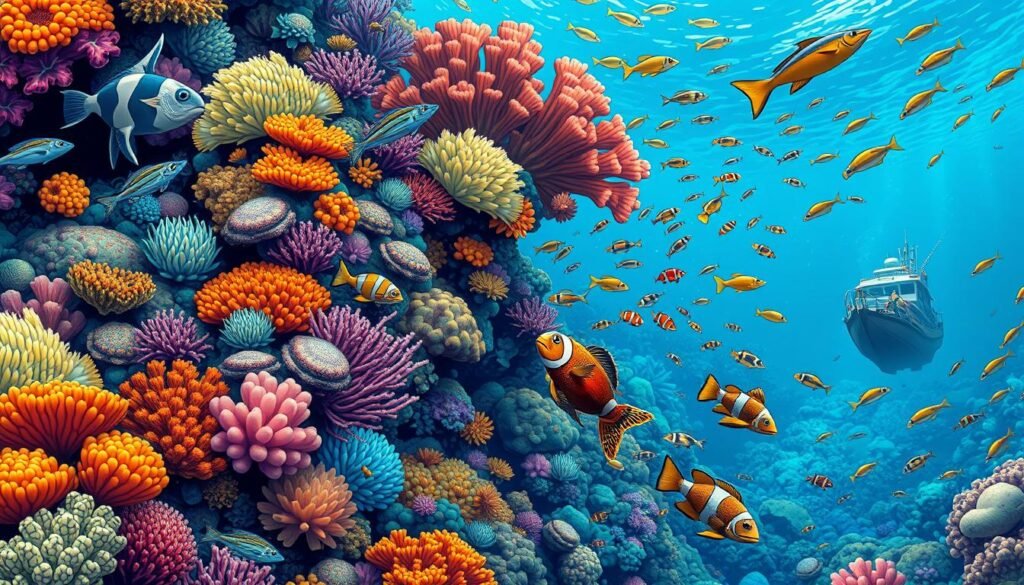
More countries are now using an ecosystem-based approach to manage their fisheries. This means looking at the whole ecosystem, not just fish. It’s a step towards sustainable fishing that helps both the environment and local communities.
| Region | Percentage of Protein from Fish |
|---|---|
| African Coastal Nations | Up to 50% |
| South Asian Coastal Nations | Up to 50% |
Global Context of Overfishing
Overfishing is a big problem worldwide, not just in the Philippines. Every year, the world catches about 200 million tonnes of fish and seafood. Most of this comes from farms, not the wild. It’s important to fish in a way that keeps the oceans healthy.
Some important numbers show how big this issue is:
- China leads in seafood production, both in total and from farms.
- Studies show a drop in bottom-dwelling fish, not just because of more fishing.
- Only about 10% of the world’s protein comes from seafood.
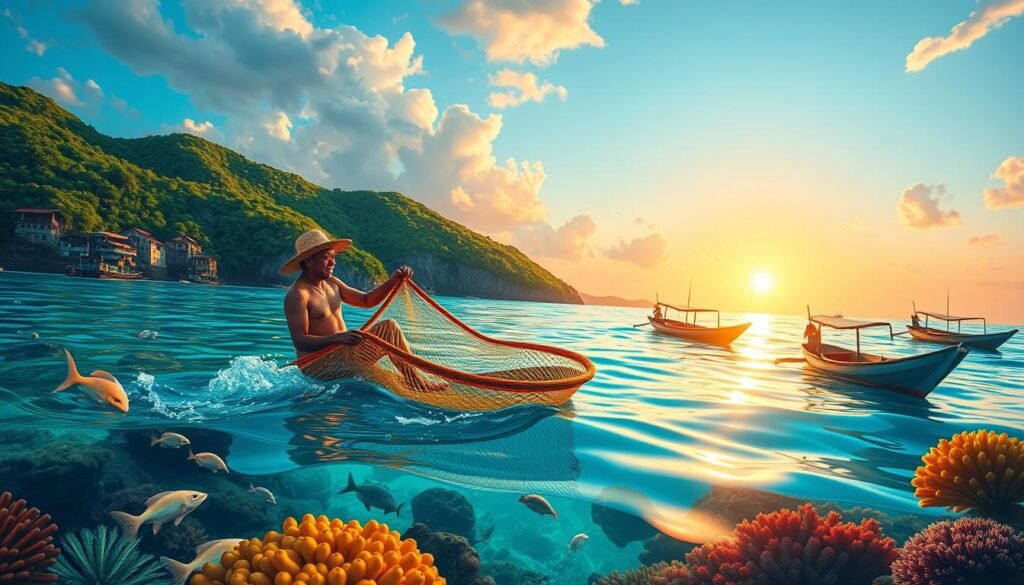
The World Bank says we need to cut fishing effort by 44 to 54%. This can make fishing more sustainable and protect fish for the future. By fishing better, we can fix overfishing and keep the oceans healthy.
Legal Framework and Regulations
The Philippine Fisheries Code is key in protecting the environment and marine life. It aims to help the country’s fisheries grow in a sustainable way.
Key aspects of the Philippine Fisheries Code include:
- Regulation of fishing practices to prevent overfishing and protect endangered species
- Establishment of marine protected areas to conserve marine life and habitats
- Promotion of sustainable fishing practices and community-based management approaches
Even with this law, enforcing it is a big challenge. It’s important to make sure the code is followed well. This will help solve problems in the country’s environment and marine life.
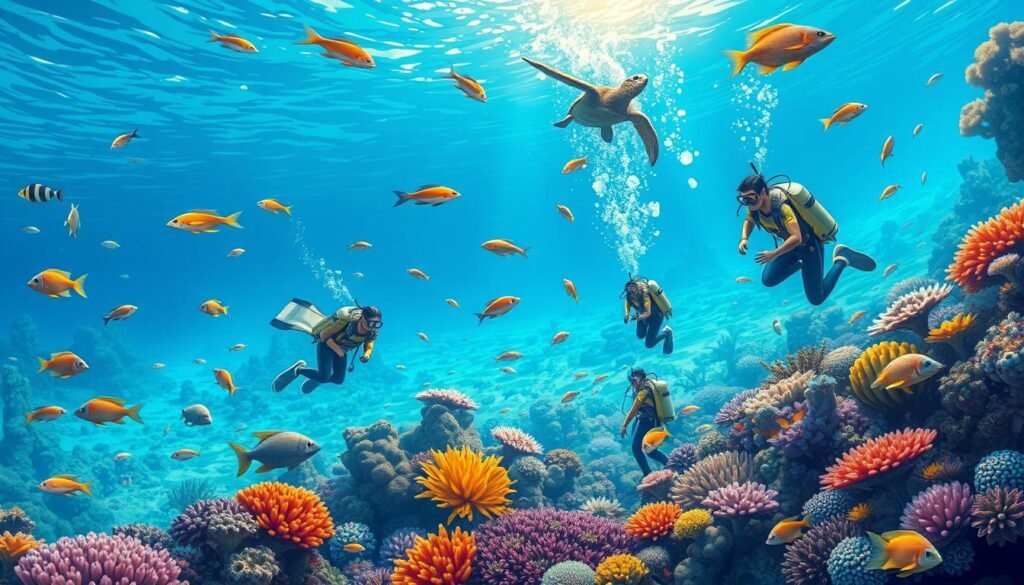
Philippine Fisheries Code Overview
The code sets a base for saving and managing the country’s fish resources. It sees the value of marine life in keeping the environment healthy.
Enforcement Challenges
It’s vital to tackle the challenges in enforcing the Philippine Fisheries Code. This will help protect the country’s marine life and environment.
Sustainable Fishing Practices
Sustainable fishing is key to solving overfishing and keeping the ocean healthy. The Philippines, a big part of the global fishing world, needs to use and share these practices. This helps protect its vast marine life.
As the second source says, sustainable fishing is vital to fight overfishing. The Tagbanua people in the Philippines have used this method for ages. They only catch certain fish at specific times, letting others grow back.
Definition and Overview
Sustainable fishing means using methods that don’t harm the ocean too much. It helps fish populations stay healthy for a long time. This includes setting catch limits, having closed seasons, and creating protected marine areas.
Successful Case Studies in the Philippines
The Philippines has shown it can do sustainable fishing well. For example, Tubbataha Reef National Park in the Sulu Sea is a protected area. It has helped fish numbers grow and reduced fishing pressure.

By choosing sustainable fishing, the Philippines can keep its oceans healthy. This also helps fishing communities have a steady income.
Role of Technology in Monitoring
Technology is key in fighting overfishing, which harms our environment and marine life. The world now eats twice as much fish as in 1960, at 20.2 kg per person. This rise in demand has led to overfishing, but tech can help.
Satellite monitoring and tracking systems can spot and track illegal fishing boats. This cuts down overfishing and saves marine life. For instance, a study used smart tech to track illegal fishing in the North Pacific. It merged boat data with satellite images.
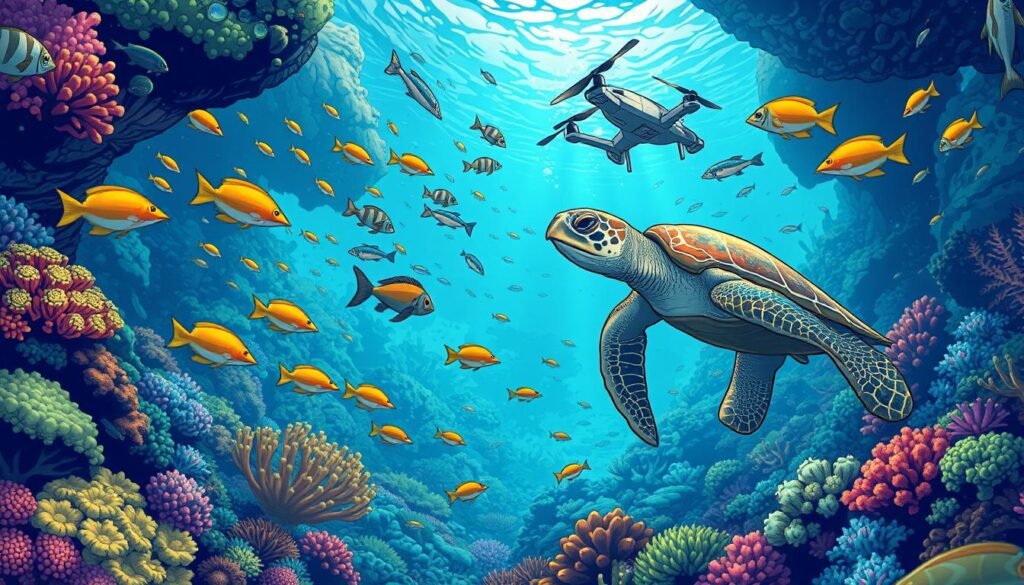
Also, environmental DNA (eDNA) methods can profile fish species on fishing boats. This tech can find where marine life is most threatened. By using these tools, we can protect our environment and marine life for the future. For more on human impact on the environment, check out this website.
Education and Awareness Campaigns
Education and awareness campaigns are key to making fishing more sustainable. By 2023, 58% of commercial fish were caught too much, down 31% from 2012. It’s vital to teach people why sustainable fishing matters and how overfishing harms the sea.
The “Catch Of The Day 2050” campaign is a great example. It shows what could happen if we keep overfishing. It uses art made from fishing nets and eco-friendly glue to highlight the problem.
Here are some ways to promote sustainable fishing:
- Start educational programs and government initiatives to teach fishers about overfishing’s effects.
- Adopt real-time traceability to track fish and fight seafood fraud.
- Support local efforts to encourage sustainable fishing and protect the sea.
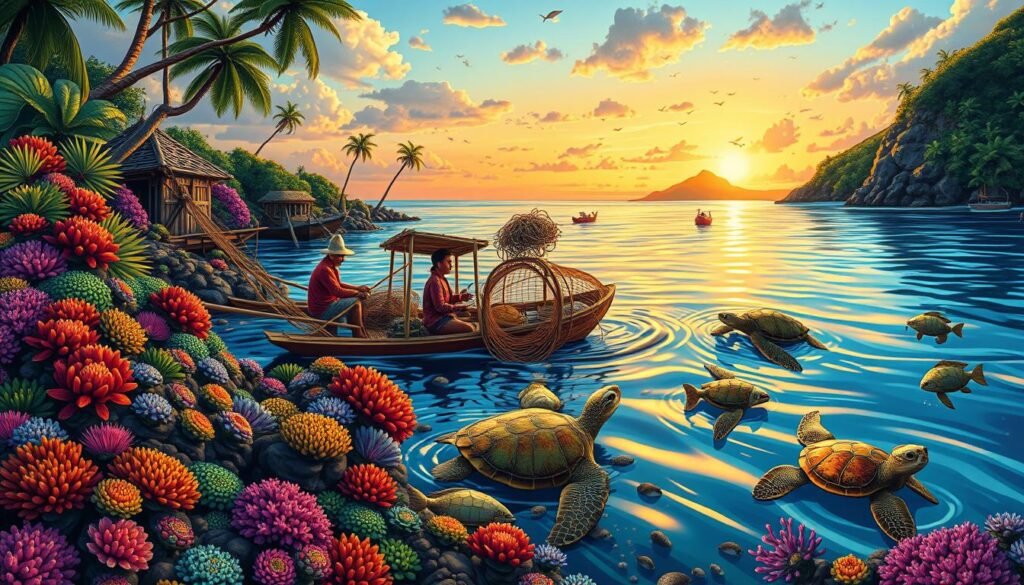
Together, we can lessen the harm of overfishing. This way, we can protect the sea for our children and grandchildren.
| Year | Percentage of Commercial Fish Harvested Beyond Sustainable Thresholds |
|---|---|
| 2012 | 89% |
| 2023 | 58% |
Community Involvement in Conservation
Getting the community involved is key to solving overfishing. It helps promote fishing that’s good for the planet. In the Philippines, for example, people have set up Marine Protected Areas (MPAs). These areas protect important marine life and help fishing stay sustainable.
Studies show that these MPAs work well. After two years, they saw big improvements. And after six years, the marine life in these areas was almost three times more than in areas where fishing was allowed.
In Madagascar, a project called Velondriake Locally Managed Marine Area (LMMA) shows how community efforts can make a difference. This project has seen a big increase in marine life. One area had 6.5 times more life than areas where fishing was allowed. Community-based conservation is vital for keeping food and jobs safe for people living by the sea.
Some great community-led projects include:
- Creating marine protected areas to save marine life
- Teaching sustainable fishing, like setting catch limits and closed seasons
- Supporting eco-tourism and jobs that don’t harm the sea
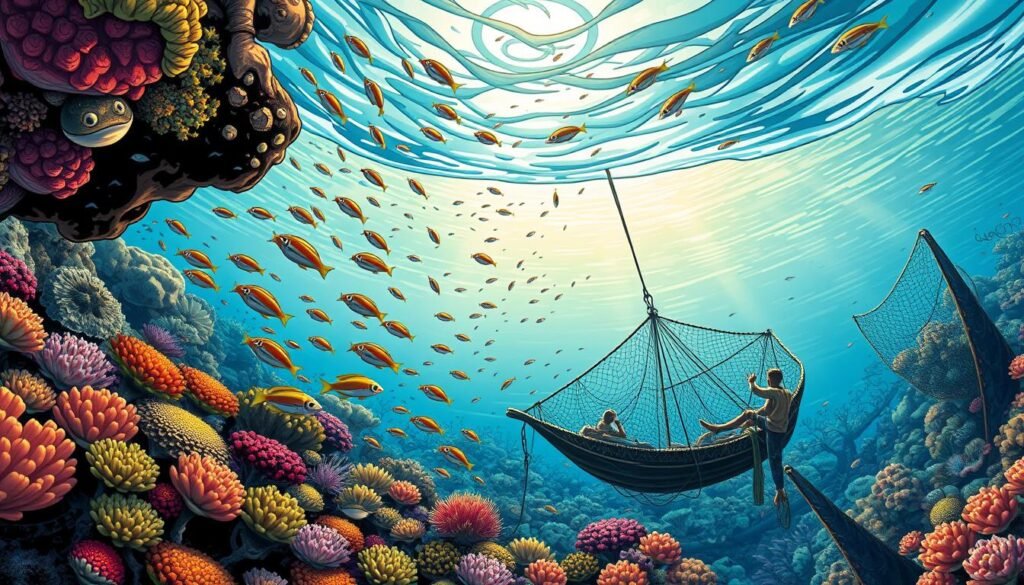
These efforts help the environment and improve life for local people. They show how important it is for communities to be involved in saving our oceans and the life in them.
| Location | Initiative | Outcome |
|---|---|---|
| Madagascar | Velondriake Locally Managed Marine Area (LMMA) | Increased biomass and protected marine biodiversity |
| Philippines | Community-driven Marine Protected Areas (MPAs) | Protected vital ecosystems and ensured sustainable fishing practices |
Collaboration with International Organizations
Working together globally is key to solving overfishing. It helps make fishing more sustainable and protects our oceans. The National Oceanic and Atmospheric Administration (NOAA) says global teamwork is vital for saving marine life and managing fish resources.
International partnerships are very important. They let us share knowledge, skills, and resources to tackle overfishing. For example, the Marine Stewardship Council (MSC) works to certify sustainable fisheries. They have labels on over 25,000 seafood products worldwide, pushing for sustainability in fishing.

- Promoting sustainability in fishing practices
- Conserving the marine ecosystem
- Sharing knowledge and expertise
- Providing access to resources and funding
Through teamwork, global organizations can ensure our oceans and fishing industry stay healthy. This benefits both our environment and the people who rely on it.
More than 820 million people depend on fisheries and aquaculture for food, nutrition, and income, highlighting the need for international collaboration to promote sustainability in fishing practices.
The Future of Philippine Fisheries
The future of Philippine fisheries is tied to managing the marine ecosystem well. We must tackle issues like losing marine biodiversity, fish stock decline, and coastal damage. The environment is key to marine life health, and conservation is vital for sustainability.
Several factors impact Philippine fisheries’ future:
- Overfishing and harmful fishing methods
- Siltation and pollution
- Waste during fish processing
- Lack of law enforcement
There are efforts to improve fisheries management and conservation. For instance, FISHCORE aims to better manage fisheries, increase their value, and boost incomes in coastal areas. The goal is to support sustainable fishing and protect the environment and marine life for future generations.
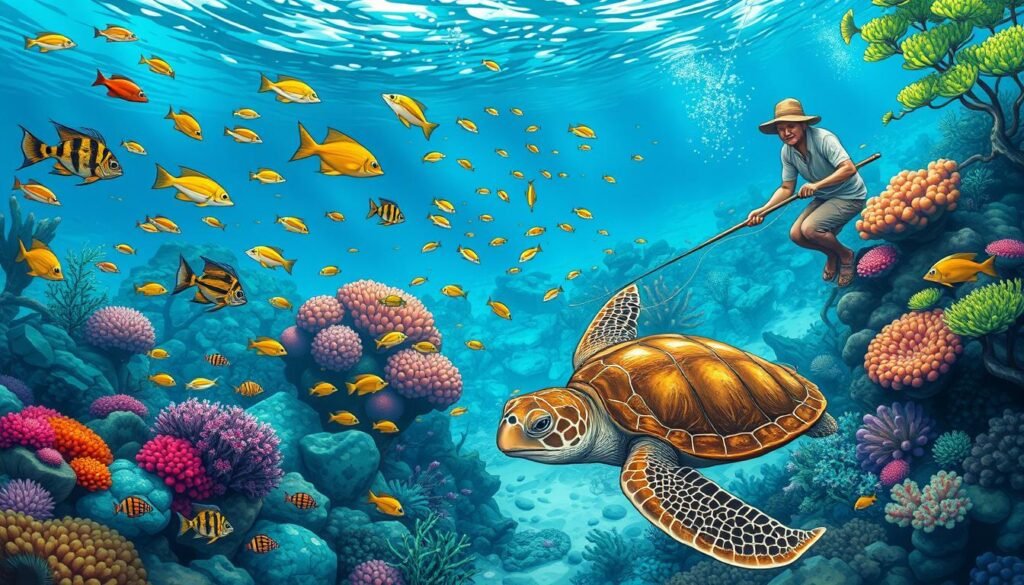
By tackling the challenges in Philippine fisheries and promoting sustainable practices, we can ensure a healthy marine ecosystem for the future. This will benefit the environment and support those who rely on marine life.
| Factor | Impact on Fisheries |
|---|---|
| Overfishing | Decline in fish stocks |
| Pollution | Harm to marine life |
| Conservation Practices | Improved sustainability |
Policy Recommendations
To tackle overfishing, we need to adopt policies that support sustainability in fishing. The data shows that policy changes are key. We should strengthen rules and enforcement, like catch-share programs and Marine Protected Areas for vulnerable species.
A study by the National Academy of Sciences (NAS) backs more investment in fishery management. It shows that better management can lead to healthier fish populations and fairer fishing quotas. Also, updates to the Magnuson-Stevens Fishery Conservation and Management Act aim to manage fish more conservatively and penalize overfishing. For more on solving overfishing, check out solutions to overfishing.
Some important policy suggestions are:
- Creating new Marine Protected Areas (MPAs) in overfished areas
- Regulating fishing in international waters
- Supporting community-based management for the long-term sustainability of marine ecosystems
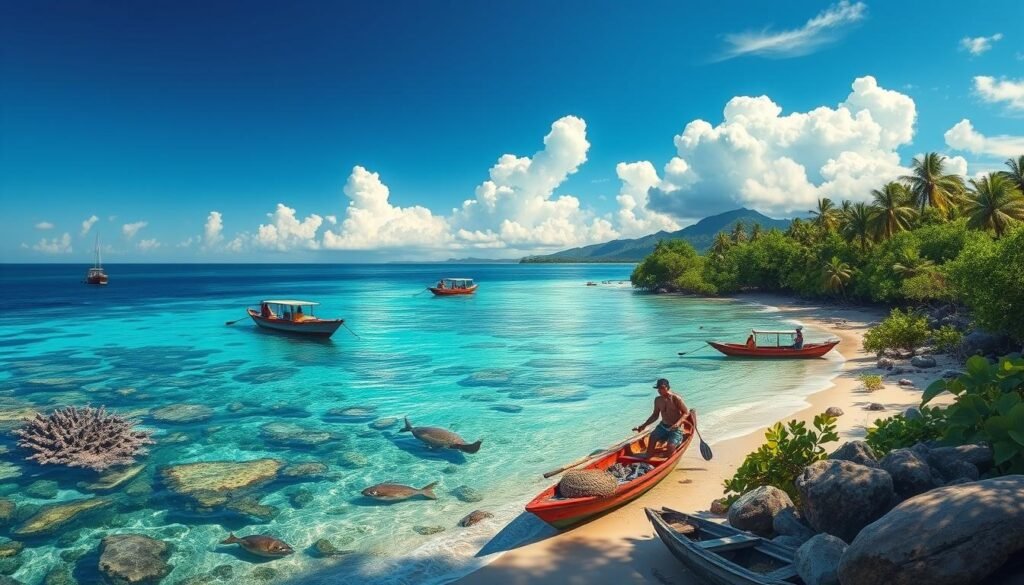
By following these policy suggestions, we can aim for a more sustainable fishing future. This will help protect our oceans for future generations.
| Policy Recommendation | Benefits |
|---|---|
| Strengthening regulations | Improved enforcement, reduced overfishing |
| Implementing Marine Protected Areas | Protection of vulnerable species, preservation of marine ecosystems |
| Promoting community-based management | Increased community involvement, more effective management of fishing practices |
Research and Development Needs
To tackle overfishing in the Philippines, research and development are key. The environment and marine life are closely connected. Knowing this is vital for sustainable fishing.
Recent data shows that 44% of fish stocks in Philippine waters are overfished or collapsed.
Some areas need more study:
- Marine pollution and its impact on marine life
- Ocean and climate change, and their effects on the environment
- Sustainable management of marine resources to prevent overfishing
Investing in research can help manage marine ecosystems sustainably. This includes making oceans healthy and productive. Overfishing costs the Philippine economy $1.1 billion each year, showing the need for action.
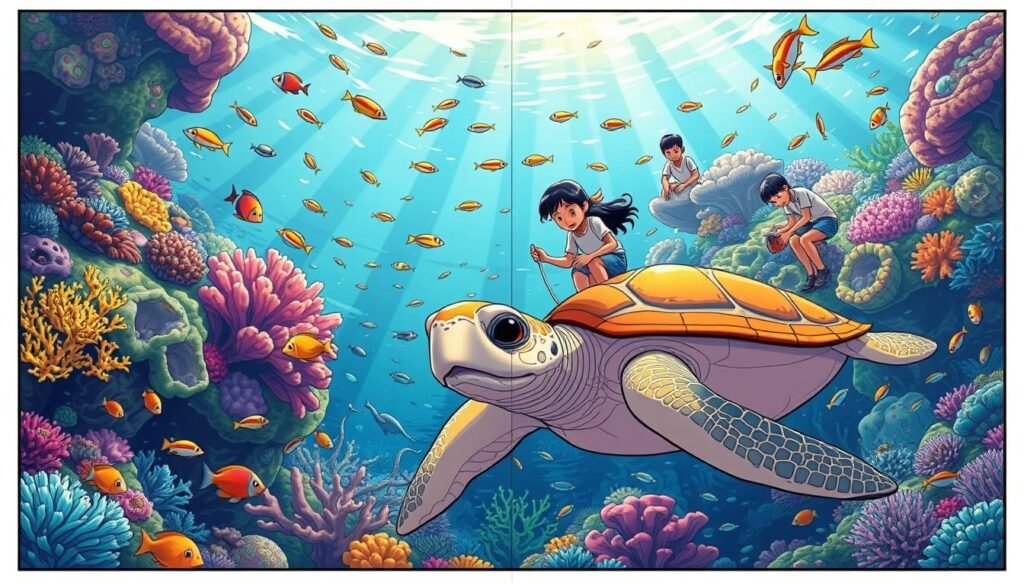
Supporting research helps us understand the environment and marine life better. This contributes to conserving the Philippines’ marine biodiversity.
Conclusion: A Call to Action
The urgent issue of overfishing needs our immediate attention and action. Marine ecosystems worldwide, including the Philippines, are facing severe fish population depletion. We must take urgent steps to save our ocean resources for the future.
Governments, local communities, and stakeholders must work together. We need to enforce fishing limits, protect habitats, and promote responsible aquaculture. Educational campaigns that raise awareness and encourage eco-friendly choices are also key. By joining forces, we can restore our marine environments and ensure sustainable fisheries for the long term.
FAQ
What is the current state of overfishing in the Philippines?
Overfishing is a big problem in the Philippines. It harms the country’s marine life and ecosystems. Fishing is important for the economy, but it’s done in ways that are not sustainable.
What are the causes and effects of overfishing in the Philippines?
Overfishing comes from illegal fishing, weak laws, and people needing to fish for a living. It leads to fewer fish, less biodiversity, and hurts those who fish for a living.
How important are Philippine marine ecosystems and biodiversity?
The Philippines has a lot of marine life, including rare species. Its marine areas, like coral reefs, are key for the economy and people’s jobs.
What are the socioeconomic implications of overfishing in the Philippines?
Overfishing hurts people who fish for a living, causing job loss and less income. It also affects the country’s economy, as fishing is a big part of it.
How does the Philippines’ overfishing problem compare to global trends?
Overfishing is a worldwide issue, and the Philippines is not alone. But, its unique environment makes it more vulnerable to overfishing’s effects.
What legal framework and regulations exist to address overfishing in the Philippines?
The Philippine Fisheries Code tries to manage fishing. But, enforcing these laws is a big challenge. Strengthening these laws and enforcement is key to solving overfishing.
What are some successful examples of sustainable fishing practices in the Philippines?
The Philippines has shown success in sustainable fishing. Community-led efforts and new fishing technologies are examples. They help keep fishing sustainable for the future.
How can technology help monitor and address the problem of overfishing?
Technology, like new fishing gear and tracking marine areas, is vital. It helps monitor and solve overfishing. Using these tools can make fishing more sustainable and protect marine life.
What is the role of education and awareness campaigns in addressing overfishing?
Education and awareness are key to fighting overfishing. They change people’s behavior and promote sustainable fishing. Successful programs in the Philippines are important for this fight.
How can community involvement contribute to marine conservation efforts?
Communities play a big role in fighting overfishing. They can support sustainable fishing and protect marine life. Local efforts and traditional practices have shown success, and they need support to keep going.
Why is international collaboration important in addressing overfishing?
Working together globally is critical to fight overfishing. It helps promote sustainable fishing and protects marine ecosystems. International support and partnerships are essential for the Philippines’ efforts.
What are the policy recommendations to address overfishing in the Philippines?
To tackle overfishing, the Philippines should strengthen laws, improve enforcement, and support community-led management. These steps are vital for the long-term health of the country’s fisheries and marine ecosystems.
What are the key areas for further research and development to address overfishing?
More research is needed to fight overfishing in the Philippines. Studying the effects of overfishing, the success of sustainable fishing, and new technologies for managing fisheries is essential. This research will help find solutions to the problem.
Source Links
- UP Professors Urge Long-term Monitoring of West Philippine Sea Resources – https://science.upd.edu.ph/up-professors-urge-long-term-monitoring-of-west-philippine-sea-resources/
- Philippine Seas in Crisis: – Greenpeace Philippines – https://www.greenpeace.org/philippines/press/1190/philippine-seas-in-crisis/
- PDF – https://actanatsci.com/makale_indir/3229
- Overfished, overfishing, and rebuilding stocks – Sustainable Fisheries UW – https://sustainablefisheries-uw.org/seafood-101/overfished-overfishing-rebuilding-stocks/
- Overfishing – https://en.wikipedia.org/wiki/Overfishing
- With growing pressures, can the Philippines sustain its marine reserves? – https://news.mongabay.com/2021/06/with-growing-pressures-can-the-philippines-sustain-its-marine-reserves/
- The Philippines’ Marine Biodiversity Faces Decimation | Earth.Org – https://earth.org/marine-biodiversity-in-the-philippines-faces-decimation/
- Longdom Publishing SL | Open Access Journals – https://www.longdom.org/open-access/the-impact-of-overfishing-on-marine-ecosystems-99707.html
- What Is Overfishing – https://www.msc.org/what-we-are-doing/oceans-at-risk/overfishing
- Global Consequences of Overfishing – International Fisheries – https://www.dfo-mpo.gc.ca/international/isu-global-eng.htm
- The economics of overfishing | Lombard Odier – https://www.lombardodier.com/insights/2024/october/the-economics-of-overfishing-can.html
- The impact of overfishing on the economy, ecosystem and social life – Caplin News – https://caplinnews.fiu.edu/the-impact-of-overfishing-on-the-economy-ecosystem-and-social-life/
- Fish and Overfishing – https://ourworldindata.org/fish-and-overfishing
- Causes of overfishing « World Ocean Review – https://worldoceanreview.com/en/wor-1/fisheries/causes-of-overfishing/
- The Threshold Effect of Overfishing on Global Fishery Outputs: International Evidence from a Sustainable Fishery Perspective – https://www.mdpi.com/2410-3888/8/2/71
- PAPER 8. LEGAL REGULATORY AND INSTITUTIONAL FRAMEWORK FOR FISHERIES AND FISHING COMMUNITY DEVELOPMENT AND MANAGEMENT – https://www.fao.org/4/x5625e/x5625e0e.htm
- IMO Legal Framework in the Fishing Sector – https://www.imo.org/en/OurWork/IIIS/Pages/IMO Legal Framework in the Fishing Sector.aspx
- Sustainable Fishing – https://education.nationalgeographic.org/resource/sustainable-fishing/
- What is sustainable fishing – https://www.msc.org/what-we-are-doing/our-approach/what-is-sustainable-fishing
- Frontiers | Emerging monitoring technologies to reduce illegal fishing activities at sea and prevent entry of fraudulent fish into markets – https://www.frontiersin.org/journals/sustainable-food-systems/articles/10.3389/fsufs.2023.1166131/full
- New Wave of Satellite Tech Can Help Protect Against Ocean Overfishing – https://www.earthisland.org/journal/index.php/articles/entry/satellite-tech-can-help-protect-against-ocean-overfishing/
- 12 Overfishing Solutions That Could Save Our Oceans – https://environment.co/10-overfishing-solutions-that-could-save-our-oceans/
- Catch of the Day 2050 Campaign – https://www.seashepherdglobal.org/latest-news/catch2050/
- New research: Community conservation means more fish in the sea – Blue Ventures – https://blueventures.org/community-conservation-means-more-fish-in-the-sea/
- Local Communities in Marine Conservation – https://pharosproject.eu/blog/local-communities-marine-conservation/
- PDF – https://philjournalsci.dost.gov.ph/images/pdf/pjs_pdf/vol152no1/assessing_community_participation_in_coastal_resource_management_in_Lupon_Davao_Oriental_.pdf
- Global Response to Overfishing and the Role of Geneva – https://www.genevaenvironmentnetwork.org/resources/updates/overfishing/
- Building a Sustainable Seafood System – https://foodtank.com/news/2017/10/sustainable-fisheries-list/
- FISH Project: The Philippine Fisheries Situation – http://oneocean.org/fish/the_philippine_fisheries_situation.html
- New Fisheries Initiative Will Benefit Over a Million People in the Philippines – https://www.worldbank.org/en/news/press-release/2023/05/31/new-fisheries-initiative-will-benefit-over-a-million-people-in-the-phi
- Fish Unloading Decline, Rising Retail Prices, Importation, and Initiatives to Improve Production – Industry Strategic Science and Technology Plans (ISPs) Platform – https://ispweb.pcaarrd.dost.gov.ph/philippine-fisheries-update-fish-unloading-decline-rising-retail-prices-importation-and-initiatives-to-improve-production/
- How To Stop Overfishing – https://unity.edu/careers/how-to-stop-overfishing/
- 6 Conclusions and Recommendations | Sustaining Marine Fisheries – https://nap.nationalacademies.org/read/6032/chapter/8
- Rules and Consequences: How to Improve International Fisheries – https://www.pewtrusts.org/en/research-and-analysis/issue-briefs/2020/07/rules-and-consequences-how-to-improve-international-fisheries
- Six practical solutions to tackle overfishing – https://www.msc.org/en-au/media-centre-anz/news-views/news/2019/05/30/six-practical-solutions-to-tackle-overfishing
- SDG 14: Life Below Water – A review of research needs – https://www.sei.org/wp-content/uploads/2018/11/sdg-14-life-below-water-review-of-research-needs-1.pdf
- Ending overfishing to counter climate change – Seas At Risk – https://seas-at-risk.org/general-news/ending-overfishing-to-counter-climate-change/
- Effect of overfishing – https://medium.com/@erzsebetfrey/effect-of-overfishing-d8ad4195e58d

